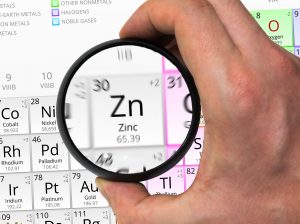Life Force. 11 Health Benefits of Zinc.
July 6, 2017 | by kateb | 0 comments
With the change of seasons and the winter months every second person has a cold, flu or gastro bug. The mineral zinc, is a super important piece to our immunity puzzle.
In fact, zinc is vital for many of the body’s processes and most people are chronically deficient in this vital mineral.
‘... As many as 2 billion people around the world have diets deficient in zinc, and studies are raising concerns about the health implications this holds for infectious disease, immune function, DNA damage and cancer.’
“Zinc is essential to … helping DNA repair. One new study has found DNA damage in humans caused by only minor zinc deficiency.” ~ Dr Joseph Mercola
In this post I share why it’s critical for a well-being and our personal experience.
Before zooming in on zinc though, lets take a closer look at minerals. Our life force.
Minerals act as co-factors for enzyme reactions in our body. Enzymes are critical as they speed up the chemical reactions in our cells. Enzymes don’t work without minerals! And every cell requires enzymes to work and function. Minerals are our life force.
A few more facts about minerals:
- Most minerals are alkalizing, helping maintain our pH balance - naturally.
- Minerals help with the transfer of nutrients across cell membranes. They are critical for good absorption and cellular health.
- They help maintain proper nerve conduction i.e. function and are vital for helping us manage our stress - naturally.
- They help contract and relax muscles, (powered by our nervous system).
- They help to regulate our bodies tissue growth, important for healing and for children’s development and growth.
- Minerals provide structural and functional support for the body.
- They allow for cellular communication.
- Research is also discovering minerals are important for microbial communication i.e. a healthy microbiome.
Without a healthy dose of minerals in our diet our bodies fundamentally will not function efficiently, predisposing us to infection, chronic illness and dis-ease. They are our life force.
Zinc.
Personally, I’ve noticed the benefits of adding more zinc into my day, including a welcomed, calmer and happier disposition, a similar benefit that I’ve noticed in the children.
Zinc is second only to iron in its concentration in our body! It’s needed for much more than treating a cold.

More important benefits of zinc:
- Nutrient absorption. It is an active agent in our body’s ability to metabolise food and nutrients. If zinc levels are low we may not be absorbing our food effectively.
- Metabolism. It is also involved with triggering over 100 differing internal enzymes required for many metabolic actions. Zinc is critical for a healthy metabolism.
- Improved Immunity. Zinc is also crucial for the health of our immune system.
- Healthy muscle growth. Zinc aids cell division and cell growth so it’s necessary for maintaining muscles and our skeletal system. It’s therefore particularly important in pregnant and lactating women and for growth in children.
- Wound healing. Zinc plays a role in the body’s ability to heal itself after an injury. It’s important for our sense of smell and is commonly linked to healthy eyes, skin and hair.
- Eye health. Zinc is needed to convert vitamin A into its active form and to maintain good vision.
- Balances hormones and supports reproductive health. It’s needed to help produce estrogen and progesterone. It also increases testosterone naturally, which has many roles for both men and women.
- Balances blood sugars. Zinc helps balance insulin, the main hormone involved in the regulation of blood sugar.
- Brain health. Zinc may act as a kind of sedative mineral on the central nervous system, acting as a calming agent and helping us to manage stress better.
- Promotes a healthy gut. One of the cornerstones of a healthy gut is strong stomach acid. Zinc is needed to help in the manufacture of our stomach acid. If you or your children suffer from reflux, consider zinc.
- Zinc and copper work together and are tightly wedded. If our copper levels are high, it’s likely we need zinc, if zinc is high it’s likely will need copper. In Western Australia we have too much copper and not enough zinc – get yourself tested!
It’s also important to note, if we are carrying heavy metals, which most of us are - mercury and nickel can compete with zinc and detrimentally displace the small amount we might have in our diets.
Depleted soils, stress, poor diet, chemicals and chronic illness are just a few of the many factors that deplete our zinc exposure and absorption. The body doesn’t store zinc so we need to make sure we get enough in our diet. Here’s how.
Top 10 foods high in zinc.
- Good clean oysters from an unpolluted ocean
- Fresh organic red meat – beef, mutton, goat and lamb
- Liver
- Fish
- Sea vegetables e.g. nori, dulse and wakame.
- Pumpkin seeds
- Chicken
- Cashews
- Mushrooms
- Adzuki beans
It’s thought that zinc is better absorbed by our body from animal sources than plant sources.
Other factors that compete for zinc in the body & lead to malabsorption;
- phytates and oxylates from foods such as grains and legumes, if not well prepared e.g. soaked and activated.
- Caffeine and tannins from tea and coffee.
- Oral contraceptives.
- Drugs such as aspirin and salicylates.
- Prolonged periods of diarrhoea.
- High fibre diets can lead to malabsorption (fibre binds to zinc travelling through the gut).
- Alcohol can reduce absorption and increases excretion of zinc.
- The heavy metal Mercury competes for zinc.
How to know if you’re deficient.
It can be difficult to test for zinc levels accurately. Try adding in more of the above foods or if you try a zinc supplement, go for a liquid or colloidal form that is pure zinc and from a brand you trust.
And always discuss any concerns or questions with your health practitioner first.
To learn more about how you can improve your wellbeing and get to the root cause, please contact me for an initial discussion. I’d love to hear from you.
References
https://www.ncbi.nlm.nih.gov/pubmed/27885880
https://www.ncbi.nlm.nih.gov/pmc/articles/PMC3724376/
http://articles.mercola.com
https://www.globalhealingcenter.com
https://www.ncbi.nlm.nih.gov/pubmed/3575353
https://www.mindd.org

